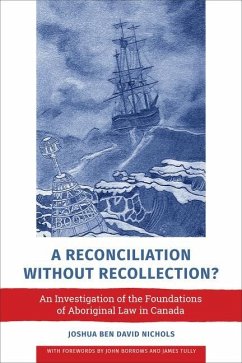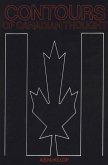Joshua Ben David Nichols
A Reconciliation Without Recollection?
An Investigation of the Foundations of Aboriginal Law in Canada
Joshua Ben David Nichols
A Reconciliation Without Recollection?
An Investigation of the Foundations of Aboriginal Law in Canada
- Broschiertes Buch
- Merkliste
- Auf die Merkliste
- Bewerten Bewerten
- Teilen
- Produkt teilen
- Produkterinnerung
- Produkterinnerung
Providing a clear, critical analysis of the history of Aboriginal law, A Reconciliation without Recollection? exposes the limitations of the current constitutional framework of reconciliation by following the lines of descent underlying the relationship between Crown and Aboriginal sovereignty.
Andere Kunden interessierten sich auch für
![The Backwoods Of Canada The Backwoods Of Canada]() Catharine Parr TraillThe Backwoods Of Canada15,99 €
Catharine Parr TraillThe Backwoods Of Canada15,99 €![Freedom and Indigenous Constitutionalism Freedom and Indigenous Constitutionalism]() John BorrowsFreedom and Indigenous Constitutionalism49,99 €
John BorrowsFreedom and Indigenous Constitutionalism49,99 €![Cannibals All! Or, Slaves Without Masters Cannibals All! Or, Slaves Without Masters]() George FitzhughCannibals All! Or, Slaves Without Masters28,99 €
George FitzhughCannibals All! Or, Slaves Without Masters28,99 €![The Path of the Law The Path of the Law]() Jr. Oliver Wendell HolmesThe Path of the Law10,99 €
Jr. Oliver Wendell HolmesThe Path of the Law10,99 €![Reconciliation Basic Seminar Reconciliation Basic Seminar]() Brian CoxReconciliation Basic Seminar18,99 €
Brian CoxReconciliation Basic Seminar18,99 €![No Treason (Volume 1) No Treason (Volume 1)]() Lysander SpoonerNo Treason (Volume 1)19,99 €
Lysander SpoonerNo Treason (Volume 1)19,99 €![Contours of Canadian Thought Contours of Canadian Thought]() A B McKillopContours of Canadian Thought42,99 €
A B McKillopContours of Canadian Thought42,99 €-
-
-
Providing a clear, critical analysis of the history of Aboriginal law, A Reconciliation without Recollection? exposes the limitations of the current constitutional framework of reconciliation by following the lines of descent underlying the relationship between Crown and Aboriginal sovereignty.
Hinweis: Dieser Artikel kann nur an eine deutsche Lieferadresse ausgeliefert werden.
Hinweis: Dieser Artikel kann nur an eine deutsche Lieferadresse ausgeliefert werden.
Produktdetails
- Produktdetails
- Verlag: University of Toronto Press
- Seitenzahl: 408
- Erscheinungstermin: 1. Februar 2020
- Englisch
- Abmessung: 226mm x 152mm x 23mm
- Gewicht: 590g
- ISBN-13: 9781487521875
- ISBN-10: 1487521871
- Artikelnr.: 55885680
- Herstellerkennzeichnung
- Libri GmbH
- Europaallee 1
- 36244 Bad Hersfeld
- gpsr@libri.de
- Verlag: University of Toronto Press
- Seitenzahl: 408
- Erscheinungstermin: 1. Februar 2020
- Englisch
- Abmessung: 226mm x 152mm x 23mm
- Gewicht: 590g
- ISBN-13: 9781487521875
- ISBN-10: 1487521871
- Artikelnr.: 55885680
- Herstellerkennzeichnung
- Libri GmbH
- Europaallee 1
- 36244 Bad Hersfeld
- gpsr@libri.de
Joshua Nichols is an assistant professor in the Faculty of Law at McGill University.
Foreword
John Borrows
Foreword
James Tully
Preface
Acknowledgments
Introduction
Part 1 Reconciliation without Recollection
1.1 Reconciliation in Canadian Jurisprudence
1.2 Reconciliation as Picture Thinking
A) Historicism
B) The Ship of State
1.3 History, Law, and Legitimacy
1.4 Problem of Reconciliation as Problem of Foundations
1.5 A Genealogy of the Indian Act
Part 2 A Genealogy of Reconciliation: Civilizing, Extinction, and
Culturalism as the Discursive Foundations of the Indian Act
2.1 Liberty and Legitimate Despotism: The Liberal-Imperialism of J.S. Mill
2.2 The Science of Savage Character: The Uncivilized and Mill’s Philosophy
of History
A) Governing the Uncivilized: The Role of the Intermediate Body
B) Peace, Order, and Good Government: Mill and the Indian Question
2.3 Reading the Right of History: Universal History and the Extinction
Thesis
2.4 From Enfranchisement to Reconciliation: Culturalism and Indirect Rule
Part 3 A Despotism for Dealing with Barbarians: A Survey of the Foundations
of Indian Policy in Canada
3.1 Pre-Confederation to the Indian Act of 1876
A) Imperial Federalism
B) Imperial Civilizing
C) Assimilation and Indirect Rule
D) Striation or Continuity?
3.2 The Indian Question and the Dominion
3.3 The Six Nations Status Case
A) The Six Nations of the Grand River
B) The League of Nations and the Mandate System
C) The Documents
3.4 A Building Crisis of Legitimacy
Part 4 A Law without Measure for a Land without Citizens: The Indian Act
in Canadian Jurisprudence
4.1 The Authority of s.91(24)
A) St Catherine’s Milling, s.91(24), and the Division of Powers
B) Interjurisdictional Immunity and s.91(24)
C) The Theory of Enclaves
D) The Uncertain Measure of Indianness
E) Section 88 and Provincial Law
4.2 The Definition of Indians and the Authority of
Bands
A) Legislative Origins
B) The Judicial Definition of Indians
C) The Judicial Definition of Bands
D) Custom Band Councils and the Question of Jurisdiction
4.3 Tsilhqot'in Nation and the Meaning of s.91(24)
Part 5 An Era of Reconciliation, An Era of Indirect Rule: From the White
Paper to the Full Box of Rights
5.1 The Hidden Player: Policy from Calder to the Indian Act, 1985
A) Line One: Legislative Renovation
B) Line Two: Land Claim Agreements
C) Line Three: Constitutional Change
D) The Penner Report
E) The Problem of Implementing the New Relationship
F) The Era of Indirect Rule and the Mechanism of Deferral
5.2 Reconciliation and Implementation
A) Unsettling the Ship of State
B) Recollection without Historicism
C) Implementing Reconciliation-with-Recollection
Select Bibliography
Index
John Borrows
Foreword
James Tully
Preface
Acknowledgments
Introduction
Part 1 Reconciliation without Recollection
1.1 Reconciliation in Canadian Jurisprudence
1.2 Reconciliation as Picture Thinking
A) Historicism
B) The Ship of State
1.3 History, Law, and Legitimacy
1.4 Problem of Reconciliation as Problem of Foundations
1.5 A Genealogy of the Indian Act
Part 2 A Genealogy of Reconciliation: Civilizing, Extinction, and
Culturalism as the Discursive Foundations of the Indian Act
2.1 Liberty and Legitimate Despotism: The Liberal-Imperialism of J.S. Mill
2.2 The Science of Savage Character: The Uncivilized and Mill’s Philosophy
of History
A) Governing the Uncivilized: The Role of the Intermediate Body
B) Peace, Order, and Good Government: Mill and the Indian Question
2.3 Reading the Right of History: Universal History and the Extinction
Thesis
2.4 From Enfranchisement to Reconciliation: Culturalism and Indirect Rule
Part 3 A Despotism for Dealing with Barbarians: A Survey of the Foundations
of Indian Policy in Canada
3.1 Pre-Confederation to the Indian Act of 1876
A) Imperial Federalism
B) Imperial Civilizing
C) Assimilation and Indirect Rule
D) Striation or Continuity?
3.2 The Indian Question and the Dominion
3.3 The Six Nations Status Case
A) The Six Nations of the Grand River
B) The League of Nations and the Mandate System
C) The Documents
3.4 A Building Crisis of Legitimacy
Part 4 A Law without Measure for a Land without Citizens: The Indian Act
in Canadian Jurisprudence
4.1 The Authority of s.91(24)
A) St Catherine’s Milling, s.91(24), and the Division of Powers
B) Interjurisdictional Immunity and s.91(24)
C) The Theory of Enclaves
D) The Uncertain Measure of Indianness
E) Section 88 and Provincial Law
4.2 The Definition of Indians and the Authority of
Bands
A) Legislative Origins
B) The Judicial Definition of Indians
C) The Judicial Definition of Bands
D) Custom Band Councils and the Question of Jurisdiction
4.3 Tsilhqot'in Nation and the Meaning of s.91(24)
Part 5 An Era of Reconciliation, An Era of Indirect Rule: From the White
Paper to the Full Box of Rights
5.1 The Hidden Player: Policy from Calder to the Indian Act, 1985
A) Line One: Legislative Renovation
B) Line Two: Land Claim Agreements
C) Line Three: Constitutional Change
D) The Penner Report
E) The Problem of Implementing the New Relationship
F) The Era of Indirect Rule and the Mechanism of Deferral
5.2 Reconciliation and Implementation
A) Unsettling the Ship of State
B) Recollection without Historicism
C) Implementing Reconciliation-with-Recollection
Select Bibliography
Index
Foreword
John Borrows
Foreword
James Tully
Preface
Acknowledgments
Introduction
Part 1 Reconciliation without Recollection
1.1 Reconciliation in Canadian Jurisprudence
1.2 Reconciliation as Picture Thinking
A) Historicism
B) The Ship of State
1.3 History, Law, and Legitimacy
1.4 Problem of Reconciliation as Problem of Foundations
1.5 A Genealogy of the Indian Act
Part 2 A Genealogy of Reconciliation: Civilizing, Extinction, and
Culturalism as the Discursive Foundations of the Indian Act
2.1 Liberty and Legitimate Despotism: The Liberal-Imperialism of J.S. Mill
2.2 The Science of Savage Character: The Uncivilized and Mill’s Philosophy
of History
A) Governing the Uncivilized: The Role of the Intermediate Body
B) Peace, Order, and Good Government: Mill and the Indian Question
2.3 Reading the Right of History: Universal History and the Extinction
Thesis
2.4 From Enfranchisement to Reconciliation: Culturalism and Indirect Rule
Part 3 A Despotism for Dealing with Barbarians: A Survey of the Foundations
of Indian Policy in Canada
3.1 Pre-Confederation to the Indian Act of 1876
A) Imperial Federalism
B) Imperial Civilizing
C) Assimilation and Indirect Rule
D) Striation or Continuity?
3.2 The Indian Question and the Dominion
3.3 The Six Nations Status Case
A) The Six Nations of the Grand River
B) The League of Nations and the Mandate System
C) The Documents
3.4 A Building Crisis of Legitimacy
Part 4 A Law without Measure for a Land without Citizens: The Indian Act
in Canadian Jurisprudence
4.1 The Authority of s.91(24)
A) St Catherine’s Milling, s.91(24), and the Division of Powers
B) Interjurisdictional Immunity and s.91(24)
C) The Theory of Enclaves
D) The Uncertain Measure of Indianness
E) Section 88 and Provincial Law
4.2 The Definition of Indians and the Authority of
Bands
A) Legislative Origins
B) The Judicial Definition of Indians
C) The Judicial Definition of Bands
D) Custom Band Councils and the Question of Jurisdiction
4.3 Tsilhqot'in Nation and the Meaning of s.91(24)
Part 5 An Era of Reconciliation, An Era of Indirect Rule: From the White
Paper to the Full Box of Rights
5.1 The Hidden Player: Policy from Calder to the Indian Act, 1985
A) Line One: Legislative Renovation
B) Line Two: Land Claim Agreements
C) Line Three: Constitutional Change
D) The Penner Report
E) The Problem of Implementing the New Relationship
F) The Era of Indirect Rule and the Mechanism of Deferral
5.2 Reconciliation and Implementation
A) Unsettling the Ship of State
B) Recollection without Historicism
C) Implementing Reconciliation-with-Recollection
Select Bibliography
Index
John Borrows
Foreword
James Tully
Preface
Acknowledgments
Introduction
Part 1 Reconciliation without Recollection
1.1 Reconciliation in Canadian Jurisprudence
1.2 Reconciliation as Picture Thinking
A) Historicism
B) The Ship of State
1.3 History, Law, and Legitimacy
1.4 Problem of Reconciliation as Problem of Foundations
1.5 A Genealogy of the Indian Act
Part 2 A Genealogy of Reconciliation: Civilizing, Extinction, and
Culturalism as the Discursive Foundations of the Indian Act
2.1 Liberty and Legitimate Despotism: The Liberal-Imperialism of J.S. Mill
2.2 The Science of Savage Character: The Uncivilized and Mill’s Philosophy
of History
A) Governing the Uncivilized: The Role of the Intermediate Body
B) Peace, Order, and Good Government: Mill and the Indian Question
2.3 Reading the Right of History: Universal History and the Extinction
Thesis
2.4 From Enfranchisement to Reconciliation: Culturalism and Indirect Rule
Part 3 A Despotism for Dealing with Barbarians: A Survey of the Foundations
of Indian Policy in Canada
3.1 Pre-Confederation to the Indian Act of 1876
A) Imperial Federalism
B) Imperial Civilizing
C) Assimilation and Indirect Rule
D) Striation or Continuity?
3.2 The Indian Question and the Dominion
3.3 The Six Nations Status Case
A) The Six Nations of the Grand River
B) The League of Nations and the Mandate System
C) The Documents
3.4 A Building Crisis of Legitimacy
Part 4 A Law without Measure for a Land without Citizens: The Indian Act
in Canadian Jurisprudence
4.1 The Authority of s.91(24)
A) St Catherine’s Milling, s.91(24), and the Division of Powers
B) Interjurisdictional Immunity and s.91(24)
C) The Theory of Enclaves
D) The Uncertain Measure of Indianness
E) Section 88 and Provincial Law
4.2 The Definition of Indians and the Authority of
Bands
A) Legislative Origins
B) The Judicial Definition of Indians
C) The Judicial Definition of Bands
D) Custom Band Councils and the Question of Jurisdiction
4.3 Tsilhqot'in Nation and the Meaning of s.91(24)
Part 5 An Era of Reconciliation, An Era of Indirect Rule: From the White
Paper to the Full Box of Rights
5.1 The Hidden Player: Policy from Calder to the Indian Act, 1985
A) Line One: Legislative Renovation
B) Line Two: Land Claim Agreements
C) Line Three: Constitutional Change
D) The Penner Report
E) The Problem of Implementing the New Relationship
F) The Era of Indirect Rule and the Mechanism of Deferral
5.2 Reconciliation and Implementation
A) Unsettling the Ship of State
B) Recollection without Historicism
C) Implementing Reconciliation-with-Recollection
Select Bibliography
Index








